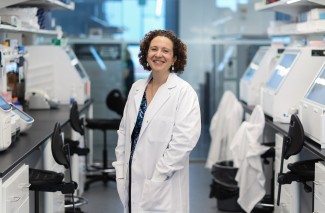How NIH funding supports resources for UK researchers

The National Institutes of Health (NIH) support research at the University of Kentucky in a variety of ways — from individual grants to supports for centers and graduate students.
Acting Vice President for Research Ilhem Messaoudi offers a breakdown of this support as part of a recent video campaign from Research Communications.
The impact of NIH-funded research
There are fundamental discoveries happening in our labs. Those innovations become new therapies and treatments for patients across UK HealthCare. Our research shapes the way we understand challenges facing Kentucky. And our innovations significantly impact Kentuckians and the nation.
Researchers on our campus create new knowledge and pass that on to the next generation of physicians and scientists. As researchers at a public university, we have the privilege of receiving funds from the National Institutes of Health. This support allows us to do the impactful work of changing lives.
What are indirect costs?
The term “indirect costs” is at the crux of the national conversation right now on federal research dollars. Indirect costs are also referred to as Facilities and Administrative costs or “F&A” costs. Federal agencies reimburse universities like UK for the real costs incurred to do research and these dollars help keep research labs going.
These costs include:
-
Building operation, maintenance and utility costs
-
High-tech lab equipment
-
High-speed data processing, storage and security
-
Grants management activities like submitting proposals and receiving, managing and reporting on funds awarded by federal agencies
-
Federal regulatory compliance like training, reviewing and reporting required to conduct federally funded projects.
Supporting graduate students
Grants from the NIH also help support the talented graduate students working in tandem with faculty in labs across UK’s campus. Together they advance science and generate new scholarship.
Indirect costs support opportunities for our students, like Joshua Moses, a graduate research assistant and second-year medical student in the Department of Physiology. Moses creates engaging and educational videos about the blood-brain barrier. He won a national award for the project.
Our graduate students represent UK at conferences and symposiums, their works are published in respected journals and many earn national awards.
Graduate students are essential partners in addressing the most pressing health challenges facing Kentuckians, and our faculty pride themselves on mentoring the next generation of researchers.




